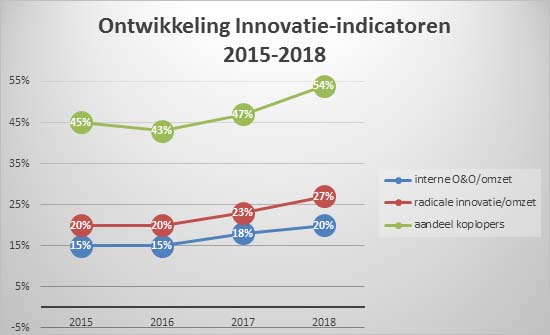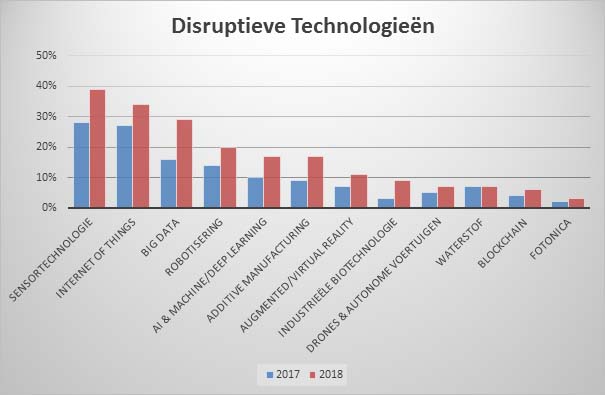Noordelijke ondernemers omarmen innovatie

Het Noord-Nederlandse mkb heeft in het afgelopen jaar volop geïnnoveerd. Dat blijkt uit de jaarlijkse Innovatiemonitor Noord-Nederland, een initiatief van het expertisecentrum Vinci van de Rijksuniversiteit Groningen (RUG) en het Samenwerkingsverband Noord-Nederland (SNN). Bedrijven hebben in 2018 aanzienlijk meer geïnvesteerd in onderzoek en ontwikkeling. Bovendien maakten zij meer gebruik van disruptieve technologieën zoals sensortechnologie en kunstmatige intelligentie.
Die ontwikkelingen sorteren zichtbaar effect: innovaties die nieuw zijn voor de markt vormen een steeds belangrijker deel van de omzet van ondervraagde bedrijven.‘Dit zijn cijfers waar de Noordelingen trots op mogen zijn en die aangeven dat er een mooie toekomst in het verschiet ligt’, zegt RUG-onderzoeker en coördinator van Innovatiemonitor dr. Thijs Broekhuizen. ‘Het belangrijkste wapenfeit is dat het jaar 2018 niet zomaar een uitschieter vormt. De toegenomen aandacht voor innovatie in het Noorden is structureel.’
Innovatieprestaties: een positieve trend
In de afgelopen vier jaar bestudeerden RUG-onderzoekers jaarlijks de innovatiekracht van midden- en kleinbedrijven. Daarbij is onder meer gekeken naar het aantal bedrijven dat zelf investeert en innoveert (koplopers), het percentage van de omzet dat wordt geïnvesteerd in onderzoek en ontwikkeling, en het percentage van de omzet dat afkomstig is uit innovatieve producten of diensten die nieuw zijn voor de markt (radicale innovaties). Het aandeel koplopers steeg van 45% in 2015 naar 54% in 2018. Ook het belang van nieuwe producten en diensten nam verder toe: in 2018 werd zelfs meer dan een kwart van de omzet gerealiseerd uit radicale innovaties.

Meer aandacht voor disruptieve technologieën
In vergelijking met 2017 is er in 2018 tevens een duidelijke toename zichtbaar in het percentage bedrijven dat actief bezig is met disruptieve technologieën. Ondernemers maken het vaakst gebruik van sensortechnologie (39%), gevolgd door Internet of Things (34%), Big Data (28%), Robotisering (20%), en Artificial Intelligence, Machine/Deep Learning (17%). Uit nadere analyses blijkt dat het gebruik van deze disruptieve technologieën niet direct leidt tot een hogere winstgevendheid. Dat er tóch geïnvesteerd wordt, geeft aan dat ondernemers durven te experimenteren en zich voorbereiden op een veranderende toekomst.

Digitale transformatie: een lastige drempel
Dit jaar zijn de ondernemers ook bevraagd naar digitalisering en digitale transformatie. ‘Veel mkb’ers hebben hun interne processen al succesvol digitaal geoptimaliseerd en daarmee kostenbesparingen gerealiseerd, maar een puur interne blik kent zijn grenzen’, zegt Broekhuizen. Elke extra euro geïnvesteerd in digitalisering levert steeds minder op. ‘Het is net zoals het verminderen van CO2-uitstoot in het productieproces, dat wordt steeds lastiger. Om de volgende horde te nemen en digitaal te transformeren is een nieuwe manier van denken nodig: hoe kan de digitale technologie zo ingezet worden dat zij meerwaarde creëert voor de klant en het businessmodel verbetert?’. Daarvoor is specialistische kennis nodig in de vorm van een digitaal specialist of team. Bedrijven die deze specialisten in huis hebben, zijn wél in staat om digitaal te blijven verbeteren.
Aandacht voor verschillende doelgroepen
De Innovatiemonitor 2019 onderzocht gedetailleerd de belemmeringen die ondernemers ervaren bij innovatie. Daarbij valt op dat mkb’ers onderling sterk verschillen. Zo ervaren koplopers andere knelpunten dan zogenoemde ‘volgers’ en ‘toepassers’. Tevens speelt de bedrijfsgrootte en de leeftijd van het bedrijf een bepalende rol bij de hindernissen die mkb’ers ondervinden bij innoveren. Het lijkt dus zinvol dat beleidsmakers bij het ontwikkelen van beleid of instrumentarium ter bevordering van innovatie en digitalisering in het mkb oog hebben voor de specifieke behoeftes van de (sub)doelgroep die zij willen bereiken. Dat geldt ook voor de communicatie met ondernemers.
Meer informatie
Contact: Thijs Broekhuizen
De Noord-Nederlandse Innovatiemonitor is een initiatief van het expertisecentrum Vinci van de Rijksuniversiteit Groningen (RUG) en het Samenwerkingsverband Noord-Nederland (SNN). Sinds 2015 worden jaarlijks zo’n vijfduizend Noord-Nederlandse mkb’ers met een vragenlijst benaderd. Het onderzoek geeft inzichten in hun innovatie-activiteiten, investeringen en prestaties. Naast de RUG en het SNN zijn ook MKB Noord, VNO-NCW Noord, TCNN, NOM, PNO Consultants, de Water Alliance, het Octrooicentrum Nederland, Koninklijke Metaalunie en Samenwerking Noord als strategische partners bij dit initiatief betrokken. De resultaten van de jaarlijkse enquête worden op 11 juli gepresenteerd.
________________________________________________
> Meer nieuws van de Faculteit Economie en Bedrijfskunde
> FEB-experts in de media


| Laatst gewijzigd: | 29 februari 2024 10:02 |
Meer nieuws
-
17 juli 2024
Veni-beurzen voor tien onderzoekers
Aan tien onderzoekers van de Rijksuniversiteit Groningen en het UMCG is een Veni-beurs van maximaal 320.000 euro toegekend. De Veni-beurzen worden jaarlijks toegekend door de Nederlandse Organisatie voor Wetenschappelijk onderzoek (NWO) en zijn...
-
08 juli 2024
Nieuwe samenwerking UGBS en Faculteit Ruimtelijke Wetenschappen: opleidingen voor professionals
Het samenbrengen van kennis en ervaring van beide partners levert nieuwe opleidingsmogelijkheden voor werkenden in uiteenlopende organisaties.
-
02 juli 2024
Roeping of noodzakelijk kwaad?
Het is belangrijk om te weten hoe werknemers hun baan zien, ontdekte Milena Nikolova. De hoogleraar Economics of Well-being onderscheidt drie verschillende arbeidsmotivaties.
